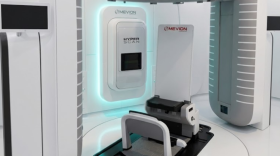On a sunny and warm day last month, Roy Underhill pulled a long-handled ax over his head, and brought the blade down on the chopping block, splitting logs for firewood. He lives in what used to be the McBane Cotton Mill in Alamance County. Artifacts from prior generations scatter the property, including an old tractor that now has a tree growing through it.
"This is ash, and it's so straight-grained you can split it pretty easily," he said as he continued to swing the ax almost effortlessly.
A few months back, he had to take it easy on wood splitting and other strenuous activity as he recovered from a bacterial infection that moved to his bloodstream and put him in the hospital.
"It's quite a common ailment and a very serious one, but can be treated with antibiotics," he said. "You need to get to it very quickly."
Fortunately, he did, and after one day in the emergency room, his fever dropped significantly. The doctors told him he needed to stay in the hospital another three days. But he qualified for a program at UNC Health by which being in the hospital didn't actually mean being at the hospital.
"'You will be at home, and we will send the medical care to you.' And I said, 'Well is this covered by insurance?' And they said, 'Yes.' I said, 'Let's do it, that's great!'"
Underhill's wooded surroundings truly are bucolic. And the room where the hospital set him up has a large window where he can see across the back of his property.
"I was able to open the curtains and look out at the old waterfall. Because we live at an old mill and the waterfall is a big part of everything," he said.
During the pandemic, hospitals have tried new ways to care for patients away from their main campuses. New hospital-at-home programs have sprung up, giving some patients the option to be cared for in more familiar settings.
"The program is designed for patients who are acutely ill enough to require hospitalization, but they're not in need of critical care or step-down level services," said Dr. Meera Udayakumar, a hospital medicine specialist and director of the UNC Health Advanced Care at Home program. She stressed this is not a recovery program. These are inpatients who receive hospital-level services.
"So those may be things like intravenous medications, diagnostic testing, like X-rays and ultrasounds, and then also visits with doctors, nurse practitioners, nurses and paramedics," she said.
Hospital-at-home programs have been a growing trend across health care. But the COVID-19 pandemic hastened their launch. So far, the UNC Health program has discharged more than 115 patients.

Patients are connected to similar devices they would be in a hospital bed, and nurses can monitor vital signs from a command center back at the hospital. The program has a group of nurses dedicated to these patients and nine paramedics who travel to patients for both scheduled and emergency calls.
"Our most common diagnosis so far is congestive heart failure. But COVID pneumonia is our second most common diagnosis," said Udayakumar. "So we have taken care of patients with that diagnosis in the home and done so successfully."
Other hospitals have similar programs, either created specifically because of, or accelerated by the pandemic. WakeMed Health has a specific COVID-19 recovery program that has seen more than 130 patients.
It's one of the few areas where the pandemic has spurred a positive change. Udayakumar said she expects the program to expand even after the pandemic ends.
"Patients who have spent a lot of time in health care facility such as patients with a cancer diagnosis, really appreciate not having to do so, and enjoy being able to be cared for in their home setting," she said.
A recent study from the Commonwealth Fund shows hospital-at-home programs improve outcomes and lower costs overall The researchers encourage health systems to expand these programs. The study notes one major barrier, though: Insurance companies can be slow to adapt to change and would need to tailor payment models to reimburse hospitals.







